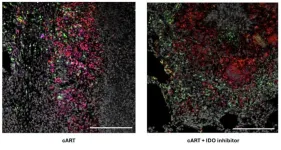(Press-News.org) We don’t all age at the same rate. But while some supercentenarians may age exceptionally slowly due to winning the genetics jackpot, a plethora of behavioral and lifestyle factors are known to speed up aging, including stress, poor sleep, poor nutrition, smoking, and alcohol. Since such environmental effects get imprinted on our genome in the form of epigenetic marks, it is possible to quantify molecular aging by characterizing the epigenome at prognostic genomic sites.
Over the past decade, scientists have developed several such ‘epigenetic clocks’, calibrated against chronological age and various lifestyle factors across large numbers of people. Most of these focused on DNA methylation in blood cells, which makes collection of samples onerous, as well as stressful for the patient. But earlier this year, scientists from the US developed a second-generation clock, called CheekAge, which is based on methylation data in easy-to-collect cells from inside the cheeks.
Now, in Frontiers in Aging, the team has shown for the first time that CheekAge can accurately predict the risk of mortality – and even if epigenetic data from another tissue is used as input.
“We also demonstrate that specific methylation sites are especially important for this correlation, revealing potential links between specific genes and processes and human mortality captured by our clock,” said Dr Maxim Shokhirev, the study’s first author and Head of Computational Biology and Data Science at the company Tally Health in New York.
CheekAge had been developed or ‘trained’ by correlating the fraction of methylation at approximately 200,000 sites with an overall score for health and lifestyle, reflecting presumed differences in physiological aging.
The biological clock is ticking
In the present study, Shokhirev and colleagues used statistical programming to see how well it predicted mortality from any cause in 1,513 women and men, born in 1921 and 1936 and followed throughout life by the Lothian Birth Cohorts (LBC) program of the University of Edinburgh. One of the LBC’s aims was to link differences in cognitive aging to lifestyle and psychosocial factors and biomedical, genetic, epigenetic, and brain imaging data. Every three years, the volunteers had their methylome in blood cells measured at approximately 450,000 DNA methylation sites. The last available methylation time point was used along with the mortality status to calculate CheekAge and its association with mortality risk. Data on mortality had been obtained from the Scottish National Health Service Central Register.
“[Our results show that] CheekAge is significantly associated with mortality in a longitudinal dataset and outcompetes first-generation clocks trained in datasets containing blood data,” concluded the authors.
Specifically, for every increase by a single standard deviation in CheekAge, the hazard ratio of all-cause mortality increased by 21%. This means that CheekAge is strongly associated with mortality risk in older adults.
“The fact that our epigenetic clock trained on cheek cells predicts mortality when measuring the methylome in blood cells suggests there are common mortality signals across tissues,” said Shokhirev.
“This implies that a simple, non-invasive cheek swab can be a valuable alternative for studying and tracking the biology of aging.”
Strongest predictors
The researchers looked at those methylation sites which were most strongly associated with mortality in greater detail. Genes located around or near these sites are potential candidates for impacting lifespan or the risk of age-related disease. For example, the gene PDZRN4, a possible tumor suppressor, and ALPK2, a gene implicated in cancer and heart health in animal models. Other genes that stood out had previously been implicated in the development of cancer, osteoporosis, inflammation, and metabolic syndrome.
“It would be intriguing to determine if genes like ALPK2 impact lifespan or health in animal models,” said Dr Adiv Johnson, the study’s last author and the Head of Scientific Affairs and Education at Tally Health.
“Future studies are also needed to identify what other associations besides all-cause mortality can be captured with CheekAge. For example, other possible associations might include the incidence of various age-related diseases or the duration of ‘healthspan’, the period of healthy life free of age-related chronic disease and disability.”
END
‘Cheeky’ discovery allows scientists to estimate your risk of dying using cells found in the mouth
New epigenetic clock based on easy-to-collect cheek cells accurately predicts mortality
2024-10-01
ELSE PRESS RELEASES FROM THIS DATE:
ChatGPT shows human-level assessment of brain tumor MRI reports
2024-10-01
As artificial intelligence advances, its uses and capabilities in real-world applications continue to reach new heights that may even surpass human expertise. In the field of radiology, where a correct diagnosis is crucial to ensure proper patient care, large language models, such as ChatGPT, could improve accuracy or at least offer a good second opinion.
To test its potential, graduate student Yasuhito Mitsuyama and Associate Professor Daiju Ueda’s team at Osaka Metropolitan University’s Graduate ...
Promising TB therapy safe for patients with HIV
2024-10-01
SAN ANTONIO (October 1, 2024) – A therapy showing promise to help control tuberculosis (TB) does not interfere with combined antiretroviral therapy (cART), according to research by Texas Biomedical Research Institute (Texas Biomed).
“This is an important hurdle that this host-directed therapy had to clear in order to help patients battling both HIV and TB,” said Texas Biomed Professor Smriti Mehra, Ph.D., who led the study recently published in the peer-reviewed journal JCI Insight.
TB is responsible for more than 1.3 million deaths worldwide every year. Dr. Mehra ...
American Academy of Pediatrics examines the impact of school expulsion and recommends ways to create supportive learning environments for all students
2024-10-01
Media Contacts:
Alex Hulvalchick, 630-626-6282
Lisa Robinson, 630-626-6084, lrobinson@aap.org
American Academy of Pediatrics Examines the Impact of School Expulsion and Recommends Ways to Create Supportive Learning Environments for All Students
Updated policy statement on school suspension to be released during the AAP 2024 National Conference & Exhibition in Orlando.
ORLANDO, Fla.--Suspending or expelling a student is one of the most severe punishments a school can impose on a student – and it can have lifelong, devastating consequences. ...
Most pregnant people got vaccinated for COVID-19 in 2022
2024-10-01
A study of more than 28,000 pregnancies from 2022 has found that the majority of pregnant people received the COVID-19 vaccine during its initial release.
The study, co-led by McMaster University and the University of British Columbia, used data from ICES, an independent, not-for-profit research institute, to provide insight into vaccination rates among one of the groups most vulnerable to health complications caused by COVID-19.
The research, published in the Canadian Medical Association Journal (CMAJ) ...
Coral reef destruction a threat to human rights
2024-10-01
A human rights-based approach to coral reef protection could ensure governments are held to account for safeguarding marine ecosystems and empower local and Indigenous communities to demand sustainable solutions and climate justice, a new study suggests.
An estimated one billion people rely on healthy coral reefs globally for food security, coastal protection and income from tourism and other services. If reefs and their ecosystems are lost, the impact on human health and economic wellbeing would be catastrophic.
Lead ...
Tongan volcanic eruption triggered by explosion as big as ‘five underground nuclear bombs’
2024-10-01
The Hunga Tonga underwater volcano was one of the largest volcanic eruptions in history, and now, two years later, new research from The Australian National University (ANU) has revealed its main trigger.
Until now, the cause of the cataclysmic event has remained largely a mystery to the scientific community, yet a student-led team of ANU seismologists has been able to shed new light on the natural explosion that initiated the event.
The student researchers analysed the climactic event’s noisy but valuable seismic ...
Syrian hamsters reveal genetic secret to hibernation
2024-10-01
A gene that limits cellular damage could be the key to surviving prolonged cold exposure.
Researchers have identified a gene that enables mammalian cells to survive for long periods at extremely low temperature, which animals experience during hibernation.
Body temperatures below 10 degrees Celsius (°C) swiftly prove fatal for humans and many other mammals, because prolonged cold stress causes cells to accumulate damaging free radicals—in particular lipid peroxide radicals—resulting in cell death and organ failure. But a few mammalian species can survive cold stress by hibernating. Hibernation in many small mammals involves ...
Tracking microplastics: FAMU-FSU College of Engineering researcher helps discover how microplastics move for better storm water management
2024-10-01
Microplastic pollution is a significant environmental problem that harms animals and people and affects ecosystems worldwide. These tiny pieces of plastic, smaller than five millimeters, are pushed by wind and water to move around the globe.
Nasrin Alamdari, an assistant professor in the FAMU-FSU College of Engineering’s Department of Civil and Environmental Engineering, is on a mission to learn more about microplastics and how they move.
In research published in Environmental Pollution, she helped examine how shape, size and density affect the speed at which ...
The Lancet Psychiatry: Conversion practice linked to greater risk of mental health symptoms, surveys of LGBTQ+ people in the USA suggest
2024-09-30
Analysis of questionnaires completed by 4,426 LGBTQ+ people in the USA suggests undergoing conversion practice targeting gender identity or sexual orientation is linked with symptoms of depression, PTSD and suicidal thoughts or attempts.
Cisgender and transgender participants also had more severe symptoms of depression and PTSD if they had undergone conversion practice.
Cisgender participants subjected to both types of conversion practice had a greater risk of suicidal thoughts and attempts than transgender participants – but mental health symptoms were more severe for transgender people overall, ...
Most accurate ultrasound test could detect 96% of women with ovarian cancer
2024-09-30
An ultrasound test that detected 96% of ovarian cancers in postmenopausal women should replace current standard of care test in the UK according to a new study.
In a paper published in Lancet Oncology today (Monday 30 September), research funded by the National Institute for Health and Care Research (NIHR) and led by Professor Sudha Sundar from the University of Birmingham compared all currently available tests to diagnose ovarian cancer in postmenopausal women head-to-head in a high-quality diagnostic test accuracy study.
Of the six diagnostic tests investigated, ...
LAST 30 PRESS RELEASES:
Chimps’ love for crystals could help us understand our own ancestors’ fascination with these stones
Vaginal estrogen therapy not linked to cancer recurrence in survivors of endometrial cancer
How estrogen helps protect women from high blood pressure
Breaking the efficiency barrier: Researchers propose multi-stage solar system to harness the full spectrum
A new name, a new beginning: Building a green energy future together
From algorithms to atoms: How artificial intelligence is accelerating the discovery of next-generation energy materials
Loneliness linked to fear of embarrassment: teen research
New MOH–NUS Fellowship launched to strengthen everyday ethics in Singapore’s healthcare sector
Sungkyunkwan University researchers develop next-generation transparent electrode without rare metal indium
What's going on inside quantum computers?: New method simplifies process tomography
This ancient plant-eater had a twisted jaw and sideways-facing teeth
Jackdaw chicks listen to adults to learn about predators
Toxic algal bloom has taken a heavy toll on mental health
Beyond silicon: SKKU team presents Indium Selenide roadmap for ultra-low-power AI and quantum computing
Sugar comforts newborn babies during painful procedures
Pollen exposure linked to poorer exam results taken at the end of secondary school
7 hours 18 mins may be optimal sleep length for avoiding type 2 diabetes precursor
Around 6 deaths a year linked to clubbing in the UK
Children’s development set back years by Covid lockdowns, study reveals
Four decades of data give unique insight into the Sun’s inner life
Urban trees can absorb more CO₂ than cars emit during summer
Fund for Science and Technology awards $15 million to Scripps Oceanography
New NIH grant advances Lupus protein research
New farm-scale biochar system could cut agricultural emissions by 75 percent while removing carbon from the atmosphere
From herbal waste to high performance clean water material: Turning traditional medicine residues into powerful biochar
New sulfur-iron biochar shows powerful ability to lock up arsenic and cadmium in contaminated soils
AI-driven chart review accurately identifies potential rare disease trial participants in new study
Paleontologist Stephen Chester and colleagues reveal new clues about early primate evolution
UF research finds a gentler way to treat aggressive gum disease
Strong alcohol policy could reduce cancer in Canada
[Press-News.org] ‘Cheeky’ discovery allows scientists to estimate your risk of dying using cells found in the mouthNew epigenetic clock based on easy-to-collect cheek cells accurately predicts mortality




